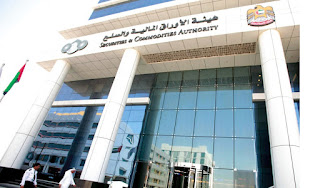UAE Securities and Commodities Authority issues two new virtual asset regulations for rulebook
According to a
recent Baker McKenzie client
alert, the UAE Security and Commodities Authority has issued two new
regulations pertaining to virtual assets. UAE SCA will be creating a list of accepted
virtual assets as well as regulations allowing already regulated financial
institutions to offer virtual asset services while amending capitalization
requirements for virtual asset exchanges, custodians, and brokers.
These
regulations while published
in Arabic were translated by Baker Mckenzie in their client report.
As per the report, the SCA has issued two new decisions, (26/RM) of 2023 in relation to Virtual Assets
Platform Operators (the “SCA VA Exchange Regulations“); and Decision No. (27/RM) of 2023 amending SCA
Chairman of the Board of Director’s Decision No. (13/RM) of 2021 in relation to
the SCA Rulebook (the “SCA Rulebook Amendments Regulations“).
The SCA VA Exchange Regulations define VAs as a “digital representation of a value
that can be traded or digitally transferred and can be used for investment
purposes, and does not include digital representations of fiat currencies,
securities, or other funds”.
The SCA VA
Exchange Regulations clarify that VA Exchange Platform Operators will be
subject to certain provisions of: the SCA Board of Director’s Decision No.
(2/R) of 2001 concerning the Regulations as to Trading, Clearing, Settlement,
Transfer of Ownership and Custody of Securities, as amended (the “SCA Trading
& Settlement Regulations“); and the SCA Rulebook (SCA Chairman of the Board
of Director’s Decision No. (13/RM) of 2021).
Samir Safar-Aly,
MENA FinTech & AI Lead at the international law firm, Baker McKenzie, told
Lara On the Block, “SCA is fulfilling its role as the federal level VASP
regulator in the UAE. Following Cabinet Resolution No. 111 of 2022, in addition
to being the UAE’s federal-level securities, commodities and capital markets
regulator, SCA became the federal VASP regulator. This is a positive step
towards making the UAE, as a whole, a jurisdiction with a supportive legal and
regulatory framework for Virtual Assets and Crypto-related services. There are
significant consumer protection and financial crime related concerns within the
Virtual Assets and Crypto sector, and having a regulatory framework to support
growth is what many major players in this space are often struggling to find in
other jurisdictions.”
Baker Mckenzie states that the SCA have taken a similar approach to that of the DIFC’s DFSA
and the ADGM’s FSRA (both of which have taken a ‘Recognized Crypto Token’ /
‘Accepted Virtual Asset’ approach) in that no VAs may be traded on such
platforms unless approved on the SCA’s Official List of Virtual Assets.
UAE Cabinet
Resolution 112 outlines that VARA’s decisions shall be consistent with the
decisions issued by the SCA.
As for the
relationship between SCA and other regulatory authorities, Samir, explains
to Lara on the Block, “Under both Cabinet Resolution No. 111 and No. 112 of
2022, the relationship between SCA and other "Local Licensing
Authorities" (which only includes VARA at the moment), makes it clear that
the SCA would retain sole regulatory remit over "digital securities"
and "digital commodities" in Onshore UAE. Separately, UAE Cabinet
Resolution 112 outlined the relationship between the SCA and VARA in
particular, whereby there will be joint regulatory roles between the two
authorities through delegated authorities (granted to the SCA under UAE Cabinet
Resolution 111) to VARA accordingly.”
As per Baker McKenzi, the
second of the New SCA Regulations, amends certain provisions of the SCA Rulebook in relation to VAs and includes
VAs to the list of products that may be dealt or brokered by SCA-regulated
financial institutions.
The
definition of ‘Brokers’, ‘Dealers of Financial Products’, ‘Financial
Consultation’, ‘Portfolio Management’ and ‘Custody’ services, all now extend to
and cover VAs, with relevant compliance-related obligations.
Samir explains, “Under
the new SCA regulations, existing SCA-regulated financial institutions can
extend their activities to Virtual Assets. However, this will need to be in
collaboration with discussions with SCA to ensure that adequate systems,
controls, expertise and disclosures are in place, including relevant amendments
to regulatory business plans and compliance / AML policies”
Finally a new
Category 7 License in relation to VASPs has been added to the SCA Rulebook,
outlining the following capital requirements, a capitalization of AED 1 million
plus six months of operating expenses if the activity is operating a VA
Exchange Platform only; a capitalization of AED 2 million if the activity is
the Brokerage of VAs; a capitalization of AED 4 million plus six months of operating
expenses if the activity is the Custody of VAs; and a capitalization of AED 5
million plus six months of operating expenses if the operator of a VA Exchange
Platform provides any other VA service.
As for the
future, Samir expressed that both digital Securities and digital Commodities,
under Cabinet Resolution No. 111 of 2022 remain in the regulatory purview of
SCA in Onshore UAE including the ‘Onshore’ Dubai territory that VARA
covers. He expects SCA to issue guidance relevant to such products in the near
future.
As for payment tokens, Samir clarifies that this is the regulatory remit of the Central Bank of
the UAE (CBUAE). When VARA issued its Rulebooks in February this year, it
noticeably did not issue its Payments & Remittances Services Rulebook. He states,”
I would expect this to be issued in due course once similar arrangement to
those that have taken place between VARA and SCA, take place between VARA and
the CBUAE.”


Comments
Post a Comment